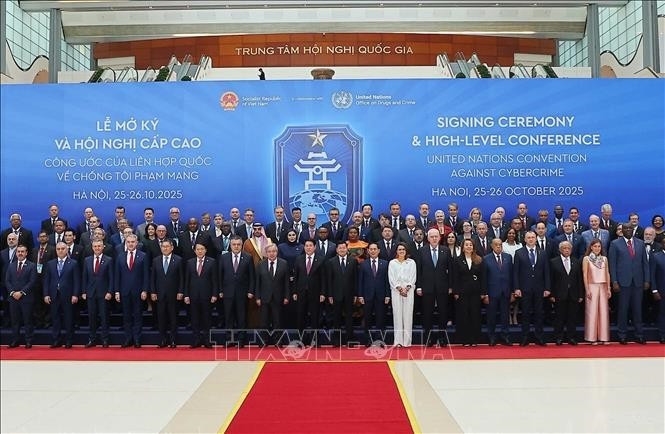The outlets noted that for Vietnam, hosting the signing of a major U.N. multilateral treaty represents an important diplomatic achievement – a clear testament to its rising international stature and its commitment to strengthening global cyber resilience amid increasing attacks on critical infrastructure.
    |
 |
|
State President Luong Cuong and U.N. Secretary-General Antonio Guterres pose for a group photo with heads of delegations attending the Signing Ceremony of the Hanoi Convention. |
According to Sputnik (Russia), the Hanoi Convention is the first of its kind to be named after Vietnam's capital Hanoi, a recognition of the country's constructive contributions to drafting the document and its growing influence on major international issues. The article also highlighted Vietnam’s domestic efforts to strengthen cybersecurity, noting that for Russia, the adoption of the Hanoi Convention holds particular significance for bilateral relations.
New Zealand’s Scoop.co.nz assessed that the event in Hanoi is the result of five years of negotiations involving UN member states, experts, civil society, academia, and the private sector. The convention establishes a common international framework for combating cybercrime, providing unified definitions, shared investigative standards, and mechanisms to support victims. It is set to usher in a new era in protecting internet users.
For governments, businesses, and online users, the Hanoi Convention is expected to bring tangible change once enforced. Investigations into ransomware, phishing, online child exploitation, crypto money laundering, and transnational fraud will now be backed by a stronger legal foundation designed to accelerate international cooperation, narrow safe havens for cybercriminals, strengthen victim protection, and enhance deterrence.
According to the U.N.’s official site news.un.org, 72 countries have signed the Hanoi Convention so far, including 64 at the plenary signing, a move praised by U.N. Secretary-General Antonio Guterres as a historic step toward a safer digital world. The ceremony, co-organized by Vietnam and the U.N. Office on Drugs and Crime (UNODC), brought together senior officials, diplomats, and experts from across all regions.
Algerie360 (Algeria) commented that the large number of signatories reflects strong global consensus on this important legal framework. Meanwhile, the KBS (the Republic of Korea) noted that with over 70 countries signing, well beyond the 40 required for the convention to take effect, the world can expect concrete and effective progress in the fight against online fraud under a clearer legal and cooperative framework.
Source: VNA